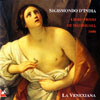India (Il) Primo Libro de Madrigali
View record and artist detailsRecord and Artist Details
Composer or Director: Sigismondo d' India
Genre:
Vocal
Label: Glossa
Magazine Review Date: 6/2001
Media Format: CD or Download
Media Runtime: 49
Catalogue Number: GCD920908

Tracks:
| Composition | Artist Credit |
|---|---|
| Madrigals, Book 1, '(Il) Primo libro de madrigali' |
Sigismondo d' India, Composer
(La) Venexiana Sigismondo d' India, Composer |
Author:
The northern and southern Italian madrigal traditions meet in the person of Sigismondo d’India. The date of publication of this, his First Book of Madrigals (1606) reveals him to be one of the last of the genre’s most significant figures. Just think: by this time the majority of Monteverdi’s publications were already in existence, and Gesualdo’s too. The influence of both is clearly audible, and not just in the music. D’India’s position as an ambitious latecomer at the feast is clear from the number of texts taken over from his forerunners: Monteverdi, naturally, but also Luzzaschi and Marenzio.
My favourite track here is perhaps Felice chi ti miro, although much of the tripartite Interdette speranze is equally impressive (despite some slight miscalculations of pacing, or so it seems to me). So successful are these performances that criticism is largely confined to comparison, and so one is tempted to speculate, for instance, as to how d’India might sound in the hands of La Venexiana’s rivals. Comparing their previous recording of Gesualdo’s Fourth Book with Concerto Italiano’s Gesualdo anthology (A/00), I found that La Venexiana tend to play it ‘straighter’, emphasising formal continuity where Alessandrini atomises the text, extracting the most out of every word.
So it is here, and sometimes one is struck that a phrase or sentiment might have been more dramatically and elastically projected, or else lingered over and savoured (even) longer. As to tuning, it is generally very accurate, and the slightest slip stands out (usually most noticeable in the highest voice, inevitably the most exposed). But that’s the problem with tuning: standards are so high nowadays that critics risk expecting something inhuman, or at least superhuman. This will do just fine
My favourite track here is perhaps Felice chi ti miro, although much of the tripartite Interdette speranze is equally impressive (despite some slight miscalculations of pacing, or so it seems to me). So successful are these performances that criticism is largely confined to comparison, and so one is tempted to speculate, for instance, as to how d’India might sound in the hands of La Venexiana’s rivals. Comparing their previous recording of Gesualdo’s Fourth Book with Concerto Italiano’s Gesualdo anthology (A/00), I found that La Venexiana tend to play it ‘straighter’, emphasising formal continuity where Alessandrini atomises the text, extracting the most out of every word.
So it is here, and sometimes one is struck that a phrase or sentiment might have been more dramatically and elastically projected, or else lingered over and savoured (even) longer. As to tuning, it is generally very accurate, and the slightest slip stands out (usually most noticeable in the highest voice, inevitably the most exposed). But that’s the problem with tuning: standards are so high nowadays that critics risk expecting something inhuman, or at least superhuman. This will do just fine
Discover the world's largest classical music catalogue with Presto Music.

Gramophone Digital Club
- Digital Edition
- Digital Archive
- Reviews Database
- Full website access
From £8.75 / month
Subscribe
Gramophone Full Club
- Print Edition
- Digital Edition
- Digital Archive
- Reviews Database
- Full website access
From £11.00 / month
Subscribe
If you are a library, university or other organisation that would be interested in an institutional subscription to Gramophone please click here for further information.




